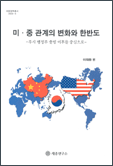This book intends to analyze the Sino-U.S. relationship by taking into consideration the positions of both nations. To understand the shaping of the new order in Northeast Asia, this relationship must be understood. The Sino-U.S. relationship is an important variable that can influence the peace structure on the Korean peninsula. If the U.S.-China relation-ship deteriorates over Taiwan or TMD issues, peace on the Korean peninsula and in Northeast Asia will be adversely affected. Since the inauguration of the Bush administration, the Sino-U.S. relationship has been strained and the security of Northeast Asia has been unclear. After 9/11 however, now challenges and opportunities have arisen in Northeast Asia. From the Chinese perspective, Dr. Che Surong, a specialist in Sino-U.S. relations at Qinghua University, and Dr. Zu Peng, professor of International Relations at Beijing University, analyze China's policy toward the U.S. with a special focus on Taiwan and MD issues. While their individual analysis differs, both agreed that the China-U.S. relationship would not lead to conflict. As such, both felt that it is necessary for the two countries to continue to engage in strategic dialogue. Dr. Dae Woo Lee, who has studied the U.S. government's Northeast Asia policy, presented an analysis of the U.S. government's policy toward china. For his part, Dr. Tai Hwan Lee analyzed the changes in the U.S-China relationship and reviewed the influence of these changes on the Korean peninsula.
No : 2002-04
Publishing Company : The Sejong Institute
Date of Publication : 2002
Number Of Pages : 156 Page
Price : 6,000 Won

